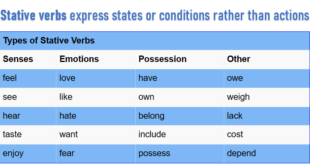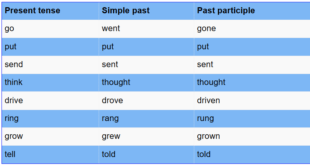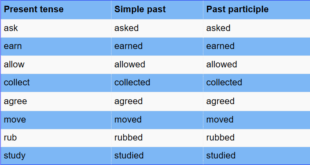![]()
Stative verb (also called State verb)
State verbs express states or conditions rather than actions.
- I want some chocolate.
- I have a cellphone.
- We own this car.
- He needs more time.
We do not use a state verb in continuous form because it has a sense of continuity.
- ꭗ I am needing a new car. ✓ I need a new car.
- ꭗ You can’t pleasing him. ✓ You can’t please him.
- ꭗ She is seeming nervous. ✓ She seems nervous.
- ꭗ It sounding great! ✓ It sounds great!
Some verbs can be either action verbs or stative verbs.
Think
(believe) I think they will succeed. [stative verb]
(act of thinking) I am thinking about buying a new car. [action verb]
Have
(own) I have a cellphone. [stative verb]
(eat, take) I am having lunch. [action verb]
Taste
(have a flavor) The food tastes good. [stative verb]
(checking its taste, testing] I am tasting the food. [action verb]
Action verb (also called Dynamic verb)
a verb that expresses a physical or mental action:
- I walk to work every day.
- He is watching TV.
- You think too much.
- I saw him last night.
We use action verbs in the past, present, or future tense:
- He walked to school. [Past tense]
- He walks to school. [Present tense]
- He will walk to school. [Future tense]
Main verb (also called Full verb or Lexical verb)
a verb that expresses the main action or the state of being of the subject.
- I don’t like turnips.
- He will come late.
- We can speak English.
Main verbs can stand alone or be used with a helping verb.
She has a car. She has crashed her car.
I speak English. I can speak French.
Helping verb (also called Auxiliary verb)
| auxiliary verbs | forms | usages | examples |
| do | do/does did |
simple tenses | I don’t like cigars. He didn’t come home. |
| be | am/is/are was/were |
continuous tenses | They are studying. I was running. |
| have | have/has had |
perfect tenses | You have seen him. She has eaten. |
- I do my homework. [main verb] – I don’t do my homework. [helping verb]
- Daniel is a teacher. [main verb] – He is teaching me English. [helping verb]
- I have a pen. [main verb] – I have broken the pen. [helping verb]
Modal verbs
Modal verbs are helping verbs too, but they follow their own rules and always take the infinitive without “to”.
- ꭗ I can to swim. ✓ I can swim.
- ꭗ Can you swimming? ✓ Can you swim?
Modals are the same for all pronouns.
- ꭗ She cans speak French. ✓ She can speak French.
- ꭗ It mays not work. ✓ It may not work.
To make a question, move the modal before the subject:
- Can you speak English?
- Will you sing us a song?
In negatives, only “cannot” is one word:
- ꭗ I can not speak Japanese. ✓ I cannot speak Japanese.
- ꭗ I willnot wait for you. ✓ I will not wait for you.
They take direct negative forms:
- You cannot park here.
- We will not come to the party.
- ꭗ you don’t should come late.
- ✓ You should not come late.
We do not combine with another modal verb:
- ꭗ I will can to buy a car soon. ✓ I will be able to buy a car soon.
- ꭗ I would must be careful. ✓ I would have to be careful.
ability/inability: can, could
-
-
- I can speak fluent English.
- Jim could read Latin when he was 10.
-
request or offer: can, could, may, would, will
-
-
- Can I use your phone? [informal]
- Can I help you? [informal]
- Could I have the bill, please? [polite]
- May I have your phone number? [polite]
- Would you like some cake? [polite]
- Will you stop here, please?
-
possibility: can, could, may, might
-
-
- It can be cold here in the winter.
- He could arrive anytime now.
- It may rain tonight.
- I might be a few minutes late.
-
permission: may, can, could
-
-
- May I come in? [polite]
- Could you wait for me, please? [polite]
- Can I park here? [informal]
- You can’t park here. [informal]
-
obligation: must
-
-
- You must keep your word.
- You must obey the orders.
-
ask/give advice: should, must
- You should see a doctor.
- Should I trust her?
- You must watch this movie. It’s really interesting.
probability: should, must
- The plane should take off anytime soon.
- Jim has been working all day; he must be tired.
expressing certainty: will, must
- I’m sure we will be late.
- Fred got promoted. He must be happy.
expressing willingness or refusal: would
- Who would work in the sun?
- The car wouldn’t start this morning.
Transitive and intransitive verbs
- I am eating. [intransitive]
- I am eating lunch. [transitive]
- Daniel is watching. [intransitive]
- Daniel is watching you. [transitive]
- I can run to the store. [intransitive]
- I can run a restaurant. [transitive]
A transitive verb is a verb that transfers the action from the subject to an object and has a direct object.
- I like books.
- He rode the bike.
- A car hit the barrier.
To identify transitive verbs, ask the question “who or what?”; and you’ll get an answer:
- Who likes books? – I like books.
- He rode what? – He rode the bike.
- What hit the barrier? – A car hit the barrier.
- I sent him a letter.
- I sent a letter to him.
- He gave Jane the book.
- He gave the book to Jane.
- She made me some coffee.
- I/He/she[subject]
- sent/gave/made [verb]
- him/Jane/me [indirect object]
- letter/book/coffee [direct object]
Intransitive verbs are verbs that don’t transfer the action to an object, so there is no object in the sentence.
- I am walking.
- The rain is falling.
- He died.
We often use a propositional phrase or an adverbial phrase after an intransitive verb to give us more information about the action.
- She is walking to school.
- Jim is walking fast.
- We arrived at his house.
- He fell into the river.
Note: Intransitive verbs cannot be used in the passive voice.
Linking verb (also called copula)
A linking verb is a verb that connects a subject to its complement without expressing an action. It describes the subject using an adjective or a noun.
- The sky is blue.
- He seems drunk.
- The weather became warmer.
We can use linking verbs with helping verbs.
- He will become king.
- This should taste good.
- She may feel guilty.
Linking verbs and action verbs
- I am hungry. [linking verb]
- I eat a sandwich. [action verb]
- He looked lonely. [linking verb]
- He looked at me. [action verb]
Finite and non-finite verbs
A finite verb functions as the main verb in a sentence and changes its form with tense, person, or number.
- I walk home.
- He eats his dinner alone.
- Mangoes are ripe.
verb tense change
- I eat a sandwich every morning. [present]
- We ate dinner at an expensive restaurant. [past]
verb person change
- I walk to school.
- She walks to school.
verb singular/plural change
- He is a teacher.
- They are students.
A nonfinite verb doesn’t change with tense, person, or number and normally can’t stand alone as the main verb in a sentence.
- I hate waiting.
- He hates waiting.
Non-finite verbs do not function as verbs in the sentence; they function as nouns, adjectives, and adverbs.
- Swimming is fun.
- He ate his roasted potatoes.
- I am ready to go.
Regular and irregular verbs
A regular verb has a usual ending in its past and past participle forms.
| Present tense | Simple past | Past participle |
| ask | asked | asked |
| earn | earned | earned |
| allow | allowed | allowed |
| collect | collected | collected |
| agree | agreed | agreed |
| move | moved | moved |
| rub | rubbed | rubbed |
| study | studied | studied |
For verbs that end in “e”, we just add “d” to make them past or past participle.
- arrive: arrived, arrived.
- bake: baked, baked.
- change: changed, changed.
- close: closed, closed.
In verbs that end in “consonant + vowel + consonant” we double the last consonant and add “ed”.
- control: controlled, controlled.
- grab: grabbed, grabbed.
- rub: rubbed, rubbed.
- drag: dragged, dragged.
Foe some verbs that end in “y”, we take out the “y” and add “ied” to make them past or past participle.
- study: studied, studied.
- worry: worried, worried.
- try: tried, tried.
An irregular verb does not follow the -d, -ed, or -ied suffix pattern.
| Present tense | Simple past | Past participle |
| go | went | gone |
| put | put | put |
| send | sent | sent |
| think | thought | thought |
| drive | drove | driven |
| ring | rang | rung |
| grow | grew | grown |
| tell | told | told |
To avoid making mistakes with irregular verbs, we should learn them by heart.
| Simple Present | Simple Past | Past Participle |
| arise | arose | arisen |
| awake | awoke or awaked | awaked or awoken |
| am, is, are | was, were | been |
| bear | bore | borne or born |
| beat | beat | beaten |
| become | became | become |
| begin | began | begun |
| bend | bent | bent |
| bet | bet | bet |
| bid | bid | bid |
| bid | bade | bidden |
| bind | bound | bound |
| bite | bit | bitten or bit |
| bleed | bled | bled |
| blow | blew | blown |
| breed | bred | bred |
| break | broke | broken |
| breed | bred | bred |
| bring | brought | brought |
| broadcast | broadcast | broadcast |
| build | built | built |
| burn | burnt/burned | burnt/burned |
| burst | burst | burst |
| buy | bought | bought |
| can | could | been able |
| cast | cast | cast |
| catch | caught | caught |
| choose | chose | chosen |
| cling | clung | clung |
| come | came | come |
| cost | cost | cost |
| creep | crept | crept |
| cut | cut | cut |
| deal | dealt | dealt |
| dig | dug | dug |
| dive | dived or dove | dived |
| do | did | done |
| draw | drew | drawn |
| dream | dreamed or dreamt | dreamed or dreamt |
| drink | drank | drunk |
| drive | drove | driven |
| eat | ate | eaten |
| fall | fell | fallen |
| feed | fed | fed |
| feel | felt | felt |
| fight | fought | fought |
| find | found | found |
| flee | fled | fled |
| fling | flung | flung |
| fly | flew | flown |
| forbid | forbade or forbad | forbidden |
| forget | forgot | forgotten or forgot |
| forgive | forgave | forgiven |
| forsake | forsook | forsaken |
| freeze | froze | frozen |
| get | got | got or gotten |
| give | gave | given |
| go | went | gone |
| grind | ground | ground |
| grow | grew | grown |
| hang | hung | hung |
| have | had | had |
| hear | heard | heard |
| hide | hid | hidden |
| hit | hit | hit |
| hold | held | held |
| hurt | hurt | hurt |
| keep | kept | kept |
| kneel | knelt | knelt |
| know | knew | known |
| lay | laid | laid |
| lead | led | led |
| lean | leant/leaned | leant/leaned |
| leap | leaped or leapt | leaped or leapt |
| learn | learnt/learned | learnt/learned |
| leave | left | left |
| lend | lent | lent |
| let | let | let |
| lie | lay | lain |
| light | lighted or lit | lighted or lit |
| lose | lost | lost |
| make | made | made |
| mean | meant | meant |
| meet | met | met |
| overtake | overtook | overtaken |
| pay | paid | paid |
| put | put | put |
| prove | proved | proved or proven |
| quit | quit | quit |
| read | read | read |
| rid | rid | rid |
| ride | rode | ridden |
| ring | rang | rung |
| rise | rose | risen |
| run | ran | run |
| say | said | said |
| see | saw | seen |
| seek | sought | sought |
| sell | sold | sold |
| send | sent | sent |
| set | set | set |
| shake | shook | shaken |
| shed | shed | shed |
| shine | shone | shone |
| shoot | shot | shot |
| show | showed | shown or showed |
| shrink | shrank | shrunk |
| shut | shut | shut |
| sing | sang | sung |
| sink | sank or sunk | sunk |
| sit | sat | sat |
| slay | slew | slain |
| sleep | slept | slept |
| sling | slung | slung |
| smell | smelt | smelt |
| sneak | sneaked or snuck | sneaked or snuck |
| speak | spoke | spoken |
| spell | spelt/spelled | spelt/spelled |
| spend | spent | spent |
| spill | spilt/spilled | spilt/spilled |
| spin | spun | spun |
| spit | spat | spat |
| spread | spread | spread |
| spring | sprang or sprung | sprung |
| stand | stood | stood |
| steal | stole | stolen |
| stick | stuck | stuck |
| sting | stung | stung |
| stink | stank or stunk | stunk |
| stride | strode | stridden |
| strike | struck | struck |
| strive | strove | striven |
| swear | swore | sworn |
| sweep | swept | swept |
| swim | swam | swum |
| swing | swung | swung |
| take | took | taken |
| teach | taught | taught |
| tear | tore | torn |
| tell | told | told |
| think | thought | thought |
| throw | threw | thrown |
| understand | understood | understood |
| wake | woke or waked | waked or woken |
| wear | wore | worn |
| weave | wove or weaved | woven or wove |
| weep | wept | wept |
| win | won | won |
| wind | wound | wound |
| wring | wrung | wrung |
| write | wrote | written |



I love your lessons Thank you very much for your help.
You’re the best.
Thanks I appreciate your hard work.
I know a lot about verbs, adverbs and adjectives and more because of reading your lessons.
Awesome! I’m an English speaker and that is the best explanation of verbs. Thanks!
I love 😍 studying Grammar.
Informative.
Thank you very much!